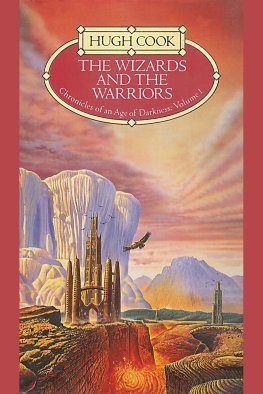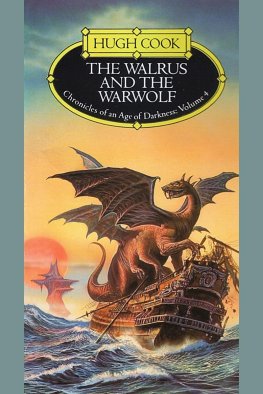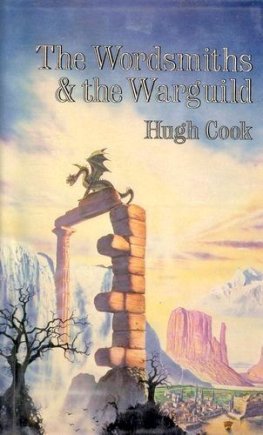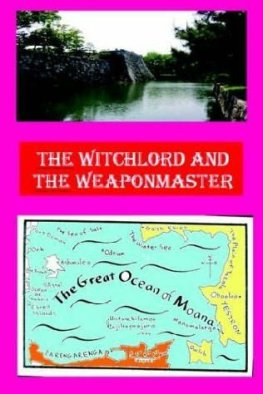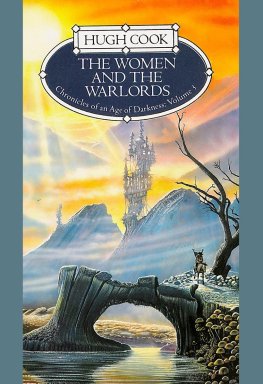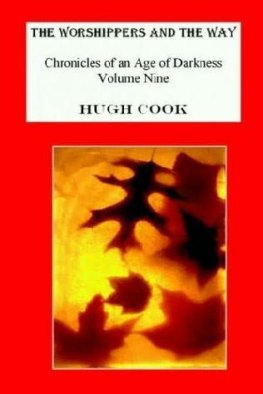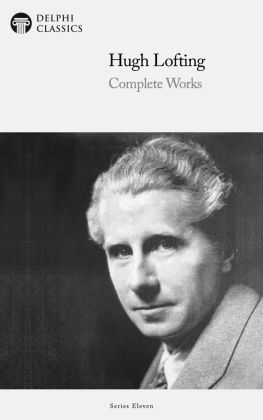Hugh Cook - The wizards and the warriors
Here you can read online Hugh Cook - The wizards and the warriors full text of the book (entire story) in english for free. Download pdf and epub, get meaning, cover and reviews about this ebook. genre: Romance novel. Description of the work, (preface) as well as reviews are available. Best literature library LitArk.com created for fans of good reading and offers a wide selection of genres:
Romance novel
Science fiction
Adventure
Detective
Science
History
Home and family
Prose
Art
Politics
Computer
Non-fiction
Religion
Business
Children
Humor
Choose a favorite category and find really read worthwhile books. Enjoy immersion in the world of imagination, feel the emotions of the characters or learn something new for yourself, make an fascinating discovery.
- Book:The wizards and the warriors
- Author:
- Genre:
- Rating:4 / 5
- Favourites:Add to favourites
- Your mark:
- 80
- 1
- 2
- 3
- 4
- 5
The wizards and the warriors: summary, description and annotation
We offer to read an annotation, description, summary or preface (depends on what the author of the book "The wizards and the warriors" wrote himself). If you haven't found the necessary information about the book — write in the comments, we will try to find it.
The wizards and the warriors — read online for free the complete book (whole text) full work
Below is the text of the book, divided by pages. System saving the place of the last page read, allows you to conveniently read the book "The wizards and the warriors" online for free, without having to search again every time where you left off. Put a bookmark, and you can go to the page where you finished reading at any time.
Font size:
Interval:
Bookmark:
The wizards and the warriors
Hugh Cook
CHAPTER ONE
Name: Phyphor. Birthplace: Galsh Ebrek. Occupation: wizard.
Status: Master wizard of the order of Arl, with powers over light and fire.
Description: very old gentleman with scarred beardless chin, bald pate, black skullcap, sheep's teeth, grey robes, iron-shod wooden staff, leather boots.
Residence: Sunside Chambers, Prime Tower, Castle of Controlling Power, near Drangsturm.
***It was Phyphor's birthday.
He was 5736 years old.
He saw no cause to celebrate.
It was windy; it was raining; he was wet; his boots were leaking. The sheep's teeth set in his jaws by enchantment were aching. He was a long, long way from home. And he was advancing into danger.
'We should reach Estar today,' said Phyphor to his travelling companions. 'So be prepared!'
His two companions were his fat, slovenly apprentice Garash, and a youngster named Miphon who had less than a century to his credit. In Estar, the three of them hoped to find the renegade wizard they had been sent to kill.
They were not in pursuit of any ordinary renegade, such as the lord of the sea dragons, the notorious Hostaja Sken-Pitilkin, wizard of Drum. No, they were after a far more dangerous quarry.
In defiance of the Confederation of Wizards, the maverick Heenmor had looted an artefact of power from the Dry Pit in the Forbidden Zone.
Phyphor's party had to seek out Heenmor, kill him, recover whatever he had stolen from the Dry Pit and present it to the Confederation in the Castle of Controlling Power.
Their chances of success and survival were, in Phyphor's estimation, about ten per cent.
***Name: Miphon.
Birthplace: Driftwood Islands.
Occupation: wizard.
Status: Minor wizard of the order of Nin, with limited powers to hear and control the minds of wild things.
Description: slender man of youthful appearance with green eyes and a ready smile; dressed in woollen underclothes, waterproof leather outers, well-greased boots and a broad-brimmed feathered hat.
Residence: lives as a travelling healer with no fixed abode.
***When Phyphor's little band encountered the evil wizard Heenmor, Miphon's only task would be to charm away the lethal copper-strike snake which always accompanied Heenmor.
Even so, he stood a good chance of getting killed.
After the catastrophic wars of antiquity known as the Days of Wrath, the Founders of the Confederation of Wizards had written this: 'Know that the Dry Pit contains power sufficient to destroy the world. As you value your lives and the world which supports those lives, preserve our absolute ban on the Dry Pit and the Forbidden Zone which surrounds it.'
Heenmor had defied that ban.
Heenmor had raided the Dry Pit.
Heenmor might be ready even now to destroy the world.
So how could they hope to defeat him?
Miphon did not worry about it at all, but wondered, instead, what new delights awaited him in Estar. Right now, he was enthralled by the rugged landscape they were travelling through. He made no mention of his pleasure to Phyphor and Garash, as both had grown dour and sour on their long journey north along the Salt Road.
Miphon wished the other two could share his joy in the wild and wonderful array of landscapes, vistas, cities, towns, villages, rocks, animals, seascapes, trees, foods, smells, songs and languages which they had encountered on their journey.
But the two wizards of Arl were immune to Miphon's enthusiasms. They were always at their worst when it was raining. And right now it was raining quite heavily.
So, as they went north along the Salt Road, with overbearing mountains on the right, and the grey tumult of the Central Ocean on the left, Miphon contented himself by singing songs of love and wonder to the donkey.
It is worth noting that Miphon, thanks to his sensible dress, was more or less waterproof, whereas both Phyphor and his apprentice Garash were soaking wet.
***Name: Smeralda. Status: beast of burden.
Description: patient grey four-legged animal burdened with books, blankets, manuscripts, herbs, tent, quilts, cooking pots, fish hooks, fishing lines, mosquito nets etc. etc.
Musical taste: severely limited, despite Miphon's best efforts in this direction.
Late in the day, the three wizards with their donkey in tow reached the southern border of Estar. There a flame trench stretched for a thousand paces from mountain cliffs to the sea, which steamed where the trench continued for another hundred paces underwater; waves surging up the trench toward the mountains boiled away to nothing before they travelled half the distance.
Phyphor had been here before.
In the days of the Long War, Phyphor and other wizards had defeated the Swarms, here on the southern border of Estar. They had defeated the Swarms, but only with the help of a storm that had raged in from the Central Ocean a storm so fierce that the legends later made said it had shaken teeth from jawbones and set the mountains to creaking. Certainly it had scattered the Neversh, breaking their strength.
It had been so close.
Only the storm had saved them.
If the Swarms had broken through, they could have spread north to the continent of Tameran and west to the Ravlish Lands. As it was, the Swarms had been driven back to the Deep South, where the wizards had built the flame trench Drangsturm and the chain of castles where the Confederation kept watch, and was pledged to keep watch forever if need be.
Though he had been here before, Phyphor scarcely recognised the place. The trench had not been maintained since the Long War, though the rubble, rubbish and erosion of four thousand years had not sufficed to fill it. A rutted track plunged to a greasy wooden duckwalk laid across the steaming mud at the bottom, then climbed the steep slope on the other side.
Nearby was a small, ruinous fort which had once guarded the southern side of the trench. On the far side, scattered blocks of masonry showed where men had once built something which the years had since pulled down.
'We'll cross tomorrow morning,' said Phyphor, who saw no need to risk that breakneck slope in the failing light, where an old wizard might miss his footing in the gloom and end up waist-deep in ovenhot mud. 'Tonight we'll shelter in the fort.'
'A damp, ugly ruin if ever I saw one,' said Garash.
'Sleep in the rain if you don't like it,' said Phyphor.
Miphon said nothing. Trying to play peacemaker between these two was, he had discovered, singularly unrewarding. Phyphor, having trained Garash, was deeply disappointed with his pupil, who had turned out to be reckless, power-hungry and amoral; Garash, for his part, bitterly resented Phyphor's refusal to release him from his apprenticeship, despite his mastery of his art.
The wind, kicking up ripples in the puddles, found no gate to bar the way as it whirled into the fortress. Entering, Garash dared a Word of Location: 'Onamonagonamonth!'
He was richly rewarded.
From half a dozen different directions, bell-like notes rang out. As the deafening noise died away, Garash cried, in great excitement: 'There's magic here! There's power!'
'Of course, fool!' roared Phyphor. 'My fire-iron, my staff of power, that oddment slung around your neck. Quite apart from all that, there's the power sources for the flame trench.'
'Oh,' said Garash, crestfallen.
'Honestly,' said Phyphor, 'Sometimes you're so stupid I feel like kicking you from here to breakfast.'
Garash did not take that criticism well.
'Let's explore,' said Phyphor.
There was little to the fort but a courtyard, a crumbling wall surrounding it, and one squat tower. Wooden stumps, the remains of floor beams, were embedded in the towerstones at three levels. A separate, steadily rising curve of stumps showed where the stairs had been. Saba Yavendar must have seen similar things in the years of chaos after the fall of the Empire of Wizards, for he had written:
Font size:
Interval:
Bookmark:
Similar books «The wizards and the warriors»
Look at similar books to The wizards and the warriors. We have selected literature similar in name and meaning in the hope of providing readers with more options to find new, interesting, not yet read works.
Discussion, reviews of the book The wizards and the warriors and just readers' own opinions. Leave your comments, write what you think about the work, its meaning or the main characters. Specify what exactly you liked and what you didn't like, and why you think so.

